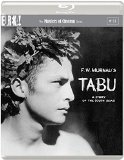 TABU: A STORY OF THE SOUTH SEAS (Masters of Cinema) (BLU-RAY) | Blu Ray | (24/06/2013)
from £8.75
| Saving you £11.24 (128.46%)
| RRP
TABU: A STORY OF THE SOUTH SEAS (Masters of Cinema) (BLU-RAY) | Blu Ray | (24/06/2013)
from £8.75
| Saving you £11.24 (128.46%)
| RRP In 1929 F. W. Murnau (Nosferatu Faust Sunrise) one of the greatest of all film directors invited leading documentarist Robert Flaherty (Nanook of the North Man of Aran) to collaborate on a film to be be shot on location in Tahiti a Polynesian idyll in which Murnau imagined a cast of island actors would provide a new form of authentic drama and offer rare insight into their primitive culture. The result of their collaboration was Tabu a film that depicts the details of indigenous island life to tell a mythical tale that is rich in the universal themes of desire and loss. Subtitled A Story of the South Seas Tabu concerns a Tahitian fisherman (played by an islander Matahi) and his love for a young woman (played by fellow islander Reri who went on to star on Broadway) whose body has been consecrated to the gods rendering her tabu as far as mortal men are concerned. The lovers flee their island and its restrictive traditions but will their love prevail in the civilised world? This Oscar-winning film (the Academy Award went to cinematographer Floyd Crosby) is both poetic and simple in tone. The Masters of Cinema Series is proud to present - completely uncensored and fully restored - this landmark film of rare exoticism and magical beauty described by critic Lotte Eisner in 1931 as the apogee of the art of the silent film for the first time ever on Blu-ray in its original aspect ratio. Special Features: New 1080p HD transfer on the Blu-ray of the Murnau-Stiftung / Luciano Berriatúa 75th anniversary restoration of the pre-Paramount longer Murnau-approved version of the film with uncensored scenes and titlecards appearing in its original 1.19:1 aspect ratio for the first time Full-length commentary track by R. Dixon Smith and Brad Stevens 15-minute German documentary about Tabu by Luciano Berriatúa Newly presented outtakes from the original shoot of the film Treibjagd in der Südsee (1940) - an archival short film 56-Page Booklet with articles by Scott Eyman Richard Griffiths and David Flaherty; an interview with the film’s cinematographer Floyd Crosby; and the original story treatments written by Murnau and Flaherty for Tabu and its aborted predecessor Turia
 TABU: A STORY OF THE SOUTH SEAS (Masters of Cinema) (DVD) | DVD | (24/06/2013)
from £17.53
| Saving you £0.46 (2.62%)
| RRP
TABU: A STORY OF THE SOUTH SEAS (Masters of Cinema) (DVD) | DVD | (24/06/2013)
from £17.53
| Saving you £0.46 (2.62%)
| RRP In 1929 F. W. Murnau (Nosferatu Faust Sunrise) one of the greatest of all film directors invited leading documentarist Robert Flaherty (Nanook of the North Man of Aran) to collaborate on a film to be be shot on location in Tahiti a Polynesian idyll in which Murnau imagined a cast of island actors would provide a new form of authentic drama and offer rare insight into their primitive culture. The result of their collaboration was Tabu a film that depicts the details of indigenous island life to tell a mythical tale that is rich in the universal themes of desire and loss. Subtitled A Story of the South Seas Tabu concerns a Tahitian fisherman (played by an islander Matahi) and his love for a young woman (played by fellow islander Reri who went on to star on Broadway) whose body has been consecrated to the gods rendering her tabu as far as mortal men are concerned. The lovers flee their island and its restrictive traditions but will their love prevail in the civilised world? This Oscar-winning film (the Academy Award went to cinematographer Floyd Crosby) is both poetic and simple in tone. The Masters of Cinema Series is proud to present - completely uncensored and fully restored - this landmark film of rare exoticism and magical beauty described by critic Lotte Eisner in 1931 as the apogee of the art of the silent film for the first time ever on Blu-ray in its original aspect ratio.
![Que La Bete Meure [1969]](/pictures/1042887.jpg) Que La Bete Meure | DVD | (25/07/2005)
from £26.98
| Saving you £-6.99 (N/A%)
| RRP
Que La Bete Meure | DVD | (25/07/2005)
from £26.98
| Saving you £-6.99 (N/A%)
| RRP Director Claude Chabrol crafts a claustrophobic and psychologically complex tale of destiny and revenge in This Man Must Die. The film begins with a birds-eye view of a young boy leaving a seaside beach and a speeding black Mustang approaching from the opposite direction. When the two collide in a hit-and-run accident the movie's action is set in motion. The boy's father Charles (Michel Duchaussoy) makes a solemn vow to find and kill the man who ended his son's life. Through a bizarre series of hunches coincidences and lucky guesses Charles tracks down Helene (Carol Cellier) the sister-in-law of the man he suspects is the killer and begins to seduce her in order to insinuate himself into her family life. When he finally comes face to face with Helene's brother-in-law Paul (Jean Yanne) he finds himself unable to act despite the man's monstrous behaviour and callous attitude. When Charles realizes that Paul's son Phillippe (Marc Di Napoli) wishes his father dead as well the forces of destiny and revenge collide. Chabrol's dense and carefully crafted narrative structure explodes in an unexpected and exhilarating chain of events leading to a cathartic and disastrous climax all portrayed through subtly evocative cinematography and terse performances. Decades later the film inspired Sean Penn's similarly themed The Crossing Guard.
![A New Kind Of Love [1963]](/pictures/1011277.jpg) A New Kind Of Love | DVD | (28/03/2005)
from £N/A
| Saving you £N/A (N/A%)
| RRP
A New Kind Of Love | DVD | (28/03/2005)
from £N/A
| Saving you £N/A (N/A%)
| RRP The fashion industry and Paris provide the sophisticated background for a comedy of wrong impressions. Joanne Woodward is mistaken as a high-priced call girl. Paul Newman is the journalist interviewing her for insights on her profession...

Please wait. Loading...
This site uses cookies.
More details in our privacy policy